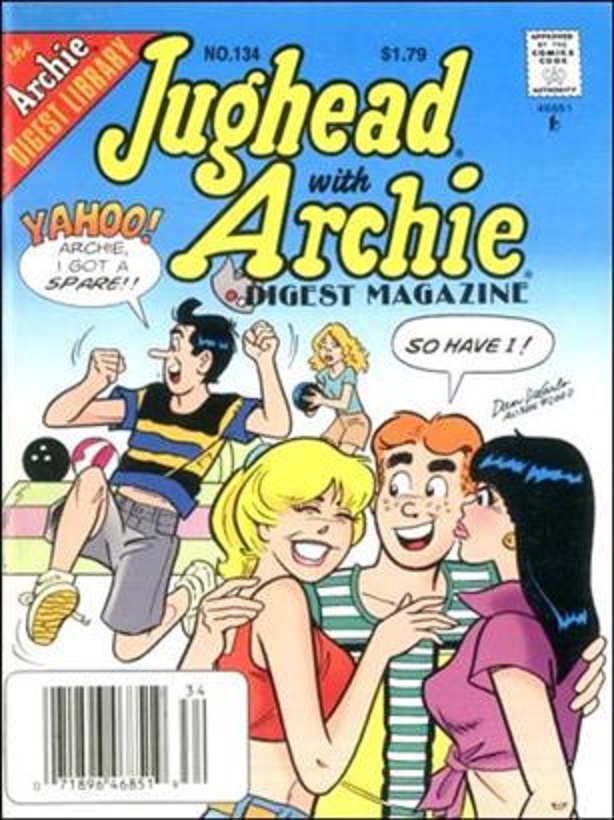Comic Book Review: Jughead with Archie Digest Magazine #134 by various creators
The Archie characters and setting first appeared in Pep Comics #22 (December 1941) as part of the M.L.J. Magazines comic book publishing line. Inspired by the wholesome Andy Hardy movies starring Mickey Rooney, Archie Andrews was a “typical American teenager” with a stable of characters that fulfilled various stock roles like “funny best friend”, “jerk who still gets to be in the friend group”, “girl next door”, “smart kid”, etc. This proved to be a winning formula, and by winter 1942, there was a magazine just for them, Archie Comics. In 1946 with the decline of superhero fandom, M.L.J. changed its own name to Archie Comics after their flagship title.

“Wholesomeness” was a large part of the Archie brand, and the company protected that reputation relentlessly. This paid off for them when the Comics Code Authority was formed to prevent outside censorship of comic books. The then leader of the company was a large force in creating the Authority, and the rules were set up to favor the kind of comics he created. Archie Comics were safe for your children.
This did have the effect of limiting the age range of most of the fans, so stories were endlessly recycled as new fans wouldn’t have seen the ones from ten or even five years before. The cast stuck to a fairly narrow band of characterization, and continuity was near non-existent. Most of the artists were encouraged to stick to a “house style” so that one Archie comic would look very much like every other Archie comic, familiar and therefore comforting.
Over the course of time, the market changed. Spinner racks began vanishing from grocery stores and pharmacies, and the specialty comic book store became the dominant distribution channel. Those places tended to favor older fans who spent their own money, not kids who had to beg their parents for allowance. Not Archie Comics’ primary audience.
Fortunately for them, because of their large backstock of extremely similar stories, Archie Comics had a way to stay in grocery stores. They started putting out reasonably priced “digest” sized reprint magazines that would fit nicely next to the candy bars and battery packs in the checkout lane at grocery stores. They were an easy sell for moms and dads to buy for their little ones. Look, wholesome entertainment just like when you were a kid!
Which brings us to today’s offering. As the title suggests, it headlines Archie’s best friend Forsythe P. “Jughead” Jones. Jughead enjoys eating, sleeping, and his pet Hot Dog. He doesn’t like hard work or conventional romance. Depending on the story, he’s asexual, aromantic, repulsed by women, or just doesn’t feel the need to get involved in romantic shenanigans. (As opposed to Archie, who’s largely defined by his desire for romantic shenanigans.) His most frequent nemesis was Big Ethel, a gangly, homely girl who had a one-sided crush on the needle-nosed fellow.
This issue opens with “The Eyes Have It”, a new story (we can tell because it has full credits) about Jughead going to the optometrist. Teacher Miss Grundy has suggested this as she’s noticed his constantly having his eyes closed in class and worried that he’s squinting to see better. Jughead turns out to have excellent vision, but gets drops put in his eyes that make him near-blind in sunlight. So naturally, that’s when he encounters Miss Grundy on the street.
“The Big Brain” is an older story, which we can tell from the design of the new computer “largest in the world!” that Mr. Lodge has installed at his business. The kids try to use it to do their homework, and the poor mechanical device is stuck trying to handle two questions at once. Nowadays the gang would just use Wikipedia.
“I Was a Teenage Jughead!” and “A Portrait of the Artist as a Young Jughead are a pair of longer stories. In the first, Jughead gets hit in the head by a box of “Market Comics” and enters into a mashup of Marvel Comics and The Wizard of Oz movie. In the second, Jughead takes a spill while painting a house and develops a desire to be taken seriously as an artist. It doesn’t last. (Resident actual artist Chuck does stash away one of the paintings just in case.)
“Planet Earth and its Weird Teenage Inhabitants” finishes the volume with an anthropological study by aliens. Jughead refuses a trip to their planet when he learns there are no burgers in space.
In between are some shorter stories, public service announcements, and simple puzzles.
This magazine is mostly harmless fun with mild predictable humor. The one story that comes closest to disturbing is the “Archie 3000” tale “Mind Games.” Future!Archie and Reggie play a virtual reality game, “Kissing Bandit”, in which the goal is to kiss pretty girls. Future!Betty and Veronica are disgruntled by this, and rig the game to force the boys to kiss many, many more girls in order to escape. Then they wonder if the game can be modified to kiss boys. Yeah.
Finding copies of this magazine in good condition might be difficult, but it’s very much a sweet nostalgia treat for people who were Archie fans at some point, and an interesting comparison point for newer fans who’ve only seen the new “modern” Archie material.
Speaking of sweet, let’s have a look at the classic Archies song, Sugar Sugar.

